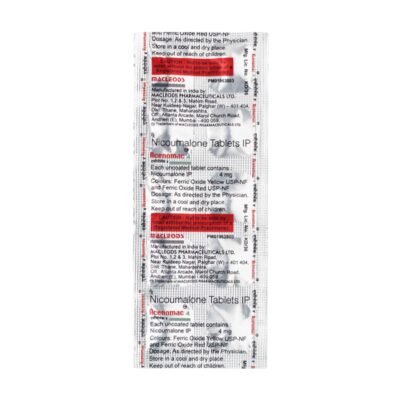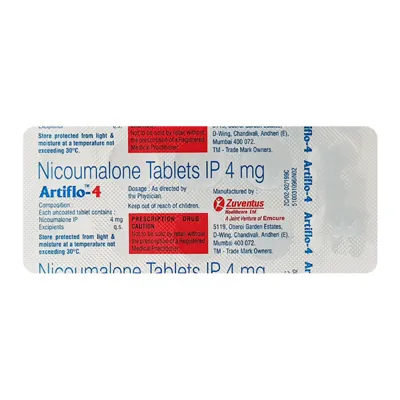🩸⚖️💊 Acenocoumarol 4mg Tablet: A Potent Oral Anticoagulant for Thrombosis Prevention
Acenocoumarol 4mg is a vitamin K antagonist (VKA) used as an oral anticoagulant to prevent and treat thromboembolic disorders such as deep vein thrombosis (DVT), pulmonary embolism (PE), and to prevent stroke in patients with atrial fibrillation or mechanical heart valves. It works by inhibiting clot formation in the bloodstream, reducing the risk of life-threatening complications caused by abnormal blood clots.
This medication is closely related to warfarin, but differs in pharmacokinetics, requiring individualized dosing and regular INR (International Normalized Ratio) monitoring.
🔬 Mechanism of Action
Acenocoumarol inhibits the enzyme vitamin K epoxide reductase, which is essential for activating vitamin K-dependent clotting factors II, VII, IX, and X in the liver. This results in:
-
Reduced production of functional clotting factors
-
Delayed blood clotting, thereby preventing thrombus formation
-
Onset of action typically occurs within 24–48 hours, with peak effect in 3–5 days
📌 Indications and Uses
Acenocoumarol 4mg is used for:
-
Prevention and treatment of deep vein thrombosis (DVT)
-
Pulmonary embolism (PE)
-
Prevention of stroke or systemic embolism in patients with atrial fibrillation
-
Prophylaxis in patients with prosthetic (mechanical) heart valves
-
Prevention of clotting in certain high-risk cardiac conditions
💊 Dosage and Administration
-
Initial dose: usually 1–4 mg once daily
-
Maintenance dose: adjusted based on INR values, typically between 1–8 mg/day
-
INR target range:
-
2.0–3.0 for most indications
-
2.5–3.5 for mechanical heart valves
-
Important:
-
Take the tablet at the same time each day
-
Do not alter the dose without consulting your doctor
-
INR testing is usually done twice weekly initially, then every 2–4 weeks once stable
⚠️ Precautions and Warnings
-
Regular INR monitoring is crucial to avoid bleeding or clotting
-
Use cautiously in:
-
Liver disease
-
Kidney impairment
-
History of bleeding disorders
-
-
Avoid sudden changes in diet (especially leafy greens high in vitamin K)
-
Not recommended during pregnancy, especially first trimester (teratogenic risk)
-
Use caution with alcohol, which may affect INR
🤒 Side Effects
Common:
-
Minor bruising
-
Nosebleeds or gum bleeding
-
Gastrointestinal upset
Serious (rare):
-
Major bleeding (e.g., GI bleeding, intracranial hemorrhage)
-
Skin necrosis
-
Purple toe syndrome
-
Allergic reactions: rash, fever
Report any unusual bleeding, black stools, or persistent headaches immediately.
🔄 Drug and Food Interactions
-
Many drug interactions including:
-
NSAIDs, antibiotics, antifungals, antiarrhythmics
-
-
Avoid herbal supplements like ginkgo, garlic, or St. John’s Wort
-
Maintain a consistent vitamin K intake from foods
-
Avoid grapefruit juice and cranberry products
🧊 Storage Instructions
-
Store below 25°C, in a dry place, away from moisture and sunlight
-
Keep out of reach of children
📝 Conclusion
Acenocoumarol 4mg is a powerful oral anticoagulant essential in the prevention and management of thromboembolic conditions. With careful INR monitoring, dose adjustment, and dietary awareness, it offers effective protection against clots. However, due to its narrow therapeutic window, it should only be used under medical supervision, with regular follow-up to ensure safe and optimal outcomes.
Note: This information is intended for educational purposes and should not replace professional medical advice. Always consult a healthcare provider for personalized guidance.




Reviews
There are no reviews yet.